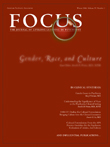From the Editors: An Introduction to FOCUS
Welcome to the first issue of FOCUS: The Journal of Lifelong Learning in Psychiatry.
As co-editors, we are excited about bringing you this new quarterly journal, which offers a whole new approach to keeping current with clinical practice in psychiatry.
We intend to provide busy clinicians with a print and electronic publication that reviews all the important clinical areas of psychiatric practice, based on the 16-subject outline of topic areas for the recertification examination published by the American Board of Psychiatry and Neurology. The journal, as its subtitle suggests, will help psychiatrists develop an individualized program of lifelong learning.
FOCUS has five unique features that we think are particularly helpful. Each issue of the journal will have a guest editor, an expert in that issue’s topic area, who will write a clinical synthesis that summarizes current clinical information on the topic. Our expert editor in this issue is James W. Jefferson, M.D., Clinical Professor of Psychiatry at the University of Wisconsin. His article summarizes a clinical approach to bipolar patients and his own clinical wisdom for the treatment of bipolar disorder. We like to think of this feature of the journal as similar to the “clinical pearls” that students and residents receive on rounds from their attending physicians. Some of the topics slated for future issues of FOCUS, such as ethics and forensic psychiatry, while less directly related to clinical treatment, will nonetheless serve to keep psychiatrists abreast of critical issues in the field.
The second feature of FOCUS is a review article designed to present a clinically relevant and comprehensive overview of one of the 16 topic areas identified by the American Board of Psychiatry and Neurology. In this first issue, we have authored an extensive review of maintenance therapy for bipolar disorder. The review article gives special attention to a particularly important aspect of this topic area, namely, the maintenance treatment of bipolar depression. To round out coverage of the topic, we have also included the APA’s revised Practice Guideline for the Treatment of Patients With Bipolar Disorder.
A third important aspect of FOCUS is that we reprint original articles that our guest editor, senior advisers, and editorial board have identified as the most influential published work in recent years. The Influential Publications section will include practice guidelines, important original research, book chapters, and notable review articles that have shaped the current practice of psychiatry. Each issue of FOCUS also includes a bibliography of important recent and classic articles that our advisers and editors believe will enhance the reader’s perspective on the topic at hand. We hope that these bibliographies will also serve as a resource for educators who want to provide residents and students with references.
Fourth, each edition of FOCUS contains continuing medical education (CME) questions worth up to five hours of category 1 credit. The credits can be obtained by submitting answers to the CME questions on paper or online, after which a certificate for CME credit is sent by mail, e-mail, or fax.
Last but not least, a subscription to FOCUS includes a self-assessment examination. In October of each year, subscribers will receive a 100-question self-assessment test, which is the successor to the APA PSA-R examination. By taking this test in print or online, subscribers can assess their own clinical learning and privately compare their performance with that of their colleagues. All subscribers who take the self-assessment test will earn up to an additional 20 units of CME credit. The answers and a resource guide will be mailed with your score report along with performance guidelines. The resource guide and performance guidelines will also be available to subscribers online through HighWire at focus.psychiatryonline.org and cme.psychiatryonline.org.
FOCUS is intended to become part of a lifelong learning and self-assessment plan for psychiatrists who wish to maintain their certification. Not every psychiatrist has a time-limited board certification, but those who were certified after October 1994 must take a recertification examination if they wish to maintain their certification. The American Board of Medical Specialties has endorsed a four-part plan for all medical specialties for maintenance of certification that includes the following: state licensure, lifelong learning and self-assessment, periodic reexamination, and practice-based assessment. For those who wish to maintain their time-limited board certification, we hope that FOCUS will be an important component of a simple yet comprehensive lifelong learning and self-assessment plan.
Our goal is to make FOCUS an approachable and user-friendly journal for clinicians. We hope that it will be a rewarding and easy way for clinicians to keep up with clinical developments. Those who wish to dig deeper into a topic will have the tools to do so in one place; using HighWire’s online search capability will make it even easier. Our vision is to supply the reader with an easy-to-use clinical compendium—each issue is a review course in itself.
We hope that FOCUS will become an essential component of your learning program throughout your professional life.



